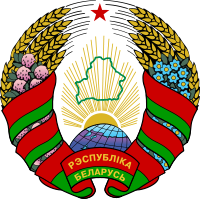- Belarusian citizenship
-
Belarusian citizenship is membership in the political community of the Republic of Belarus. Belarusian citizens hold citizenship in the Union State of Russia and Belarus.
Belarusian citizenship is acquired and terminated in accordance with the Citizenship Act of the Republic of Belarus (2002), as well as international treaties to which Belarus is a party (Treaty with Ukraine (1999), Treaty with Kazakhstan (1998), Treaty between Russia, Kazakhstan, Kyrgyzstan and Belarus (1999).
Only a person who is a Belarusian citizen by birth can be the President of the Republic of Belarus.
Contents
Belarusian citizenship in 1917-1991
Regulations regarding Belarusian citizenship were issued by Belarusian government from 1917-1991 and by the government of the Soviet Union from 1924-1991.
The Aliens Decree was issued on August 4, 1922, by the Sovnarkom of the Belarusian Soviet Socialist Republic. According to this decree, all subjects of the former Russian Empire who had permanent residence in the Byelorussian SSR, including refugees, were recognized as citizens of the Byelorussian SSR. Citizens of other Soviet Republics (such as the Russian Soviet Federative Socialist Republic) shared common rights and obligations with citizens of the Byelorussian SSR. All adults (except in the cases listed below) could apply for Belarusian SSR citizenship, and the children younger than 14 years of age of those who were granted Belarusian SSR citizenship acquired Byelorussian SSR citizenship automatically; the consent of children over 14 was necessary. Additionally, anyone could renounce citizenship. The following groups of people were deprived of citizenship (unless they received passports in consulates of Soviet Republics before January 1, 1923):
- persons who left the country without proper permission of Soviet government
- persons who struggled against the Soviet government
- persons who had the right to claim Belarusian SSR citizenship, but had opted to not claim it
Children of Belarusian SSR citizens born in the territory of the Belarusian SSR acquired citizenship at the time of birth. If only one parent held Belarusian SSR citizenship, then the citizenship of the child was determined by joint declaration of his or her parents. Without such a declaration, the child acquired citizenship of the Belarusian SSR automatically, while still retaining the right to acquire the citizenship of the non-Byelorussian parent upon becoming adult.
According to the Code of Marriage, family and guardianship of Belarusian SSR promulgated in 1927:
- children of Belarusian SSR citizens acquired citizenship by birth
- children of a Belarusian SSR citizen and a non-citizen acquired citizenship by birth if one of the parents had permanent residence in the Belarusian SSR
- children of a Belarusian SSR citizen and a non-citizen who were living abroad acquired citizenship by birth upon joint declaration of the parents
The Citizenship Act of the USSR (1930) and the Citizenship Act of the USSR (1931) declared that citizens of the USSR who lived in the territory of a Soviet Republic would become citizens of that Republic, unless they chose citizenship of another Soviet Republic in connection with their ethnic origin.
Up to the dissolution of Soviet Union, citizenship legislation became increasingly centralized. Legal norms regarding Belarusian citizenship by birth were revoked in order to bring Belarusian family law in accordance with the Principles of Legislation on Marriage and the Family of the USSR and the Union Republics (1968).
Belarusian citizenship in 1991-2002
The first citizenship act after the Belarusian declaration of independence was adopted on October 18, 1991.
The Citizenship Act (1991) has not declared succession of citizenship of the Byelorussian SSR. Citizens of the USSR who had permanently resided in Belarus were recognized by the Act as citizens of the Republic of Belarus.
Belarusian citizenship could be acquired:
- by birth
- by naturalization
- by registration (since amendments of June 15, 1993)
Citizenship by birth could be acquired if both of the parents were citizens of the Republic of Belarus. The same applied if only one of the parents was a citizen of Belarus and at the same time the child was born in Belarus, or in the case where at least one of his parents had permanent residence in Belarus. Citizenship was also granted to a child that was born in Belarus to stateless parents.
Citizenship by naturalization could be gained if the applicant:
- had permanent residence in Belarus for 7 years preceding application
- had sufficient knowledge of one of state languages
- had a legal source of income in Belarus
Citizenship Act (2002)
Acquisition of citizenship
Belarusian citizenship can be acquired:
- by birth
- by naturalization
- by registration
Citizenship by birth can be acquired by a child if one of the parents is a Belarusian citizen or both of them are permanent residents of Belarus.
Citizenship by naturalization can be gained if the applicant:
- had permanent residence in Belarus for 7 years preceding the application
- has enough knowledge of one of state languages (Belarusian or Russian)
- has legal income
- has no foreign citizenship, or will lose the foreign citizenship after acquisition of Belarusian citizenship, or has renounced his citizenship
The required period of residence can be reduced for several categories of people, including ethnic Belarusians, the descendants of ethnic Belarusians born abroad, people who held Belarusian citizenship in the past, and people who have made significant contributions to development of Belarus).
Citizenship by registration can be acquired by:
- people who hold USSR citizenship and were born in Belarus, or had a place of residence in Belarus before November 12, 1991, as well as their spouses who hold citizenship of USSR, and their descendants
- a child of a Belarusian citizen
- an adopted child
Termination of citizenship
Belarusian citizenship can be terminated by:
- renunciation of citizenship
- loss of citizenship, such as by entering the military service, police service or government service in another state.
External links
- Aliens Decree 1922 (in Russian)
- Citizenship Act 2002 (in Russian)
- Treaty with Ukraine, Treaty between Russia, Kazakhstan, Kyrgyzstan and Belarus (in Russian)
See also
Belarus topics History Principality of Polotsk · Grand Duchy of Lithuania · Polish–Lithuanian Commonwealth · Russian Empire · Belarus National Republic · Byelorussian Soviet Socialist Republic · more
Geography Government
PoliticsConstitution · President · Prime Minister · Foreign relations · Military · Political parties · Elections · Union of Russia and Belarus · Belarusian citizenship · Human rights · LGBT rights · moreEconomy Culture Artists · Education · Famous Belarusians · Kalvaryja · Belarusian language · Media · Music · Olympic history · Public holidays · moreReligion Russian Orthodox Church · Roman Catholicism · Greek Catholic Church · Autocephalous Orthodox Church · Judaism · Islam · moreOther topics Nationality laws (category) By continent AfricaAsiaArmenia · Azerbaijan · Bangladesh · Bhutan · Burma (Myanmar) · China · Cyprus (Northern Cyprus1) · India · Indonesia · Iran · Iraq · Israel · Japan · Kazakhstan · South Korea · Lebanon · Malaysia · Mongolia · Nepal · Pakistan · Philippines · Russia · Singapore · Taiwan · TurkeyOceaniaEuropeAndorra · Austria · Belarus · Belgium · Bulgaria · Croatia · Czech Republic · Denmark · Estonia · Finland · France · Germany · Greece · Hungary · Iceland · Ireland · Italy · Kazakhstan · Latvia · Lithuania · Luxembourg · Macedonia · Malta · Moldova · Monaco · Montenegro · Norway · Netherlands · Poland · Portugal · Romania · Russia · Serbia · Slovakia · Slovenia · Spain · Sweden · Switzerland · Ukraine · United KingdomNorth AmericaSouth AmericaInternational
organizationsBy type Other Defunct Notes 1 Partially unrecognised and thus unclassified by the United Nations geoscheme. It is listed following the member state the UN categorises it under.Categories:- Nationality law
- History of nationality
- Belarusian society
- Belarusian law
Wikimedia Foundation. 2010.

